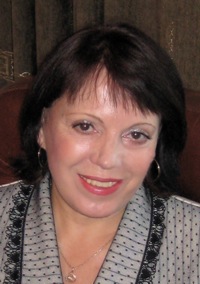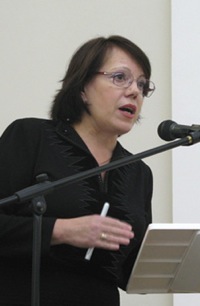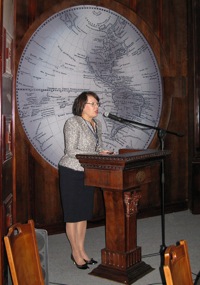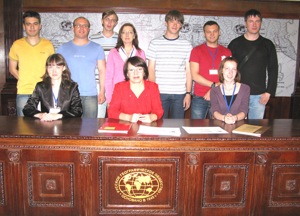
Tatyana I. Moiseenko
Professor, Corresponding Member of the Russian Academy of Sciences,
Head of the Department of Biochemistry and Ecology
V.I. Vernadsky Institute of Geochemistry and Analytical Chemistry
of the Russian Academy of Sciences
 Tatyana Moiseenko, a corresponding member of the Russian Academy of Sciences, Doctor of Biological Sciences, Professor, will celebrate her birthday anniversary. After graduation from the Biological Faculty of the Rostov State University in 1971, she was directed to the full-time postgraduate courses at the Kola Research Center, Academy of Sciences of the USSR. She began working as a junior researcher, then as a senior researcher, and finally, she became the head of the group of water problems at the Kola Research Center, Academy of Sciences of the USSR. The beginning of her research activities in the Far North was hard but very efficient. Groundless decisions and socialist industrial gigantomania affected the nature of the Far North, where mining and metallurgical works were constructed at the coasts of Lake Imandra and since the 1930s, considerable quantities of toxic substance were regularly discharged into the lake.
Tatyana Moiseenko, a corresponding member of the Russian Academy of Sciences, Doctor of Biological Sciences, Professor, will celebrate her birthday anniversary. After graduation from the Biological Faculty of the Rostov State University in 1971, she was directed to the full-time postgraduate courses at the Kola Research Center, Academy of Sciences of the USSR. She began working as a junior researcher, then as a senior researcher, and finally, she became the head of the group of water problems at the Kola Research Center, Academy of Sciences of the USSR. The beginning of her research activities in the Far North was hard but very efficient. Groundless decisions and socialist industrial gigantomania affected the nature of the Far North, where mining and metallurgical works were constructed at the coasts of Lake Imandra and since the 1930s, considerable quantities of toxic substance were regularly discharged into the lake.
Studies of inland water pollution and its environmental impacts on Lake Imandra were initiated by T.I. Moiseenko from the very beginning of her research activities (from 1971). This was the period of wide popularity of scientific concepts related to the laws of anthropogenic microevolution by S.S. Schwarz, the theory of fish stock dynamics by G.N. Nikol’skii, E. Odum ecology, and other fundamental works, which provided the basis for studies in question. In the 1970s, pollution was rather intense. The nature of the North is known to be extremely vulnerable; therefore, its transformation under the impact of human activities was rapid and sharply defined. Numerous expeditions were organized in water bodies of the Far North and were focused at both the sources of pollution and natural uncontaminated water bodies. The results of these studies served as a basis for the candidate’s thesis, which was successfully defended at the State Research Institute for Lake and River Fishery («for official use only»). Before the 1990s, all studies connected with the impact of pollution on the natural objects were confidential and meant «for official use only,» because they automatically came under the legal article pertaining to the concealment of large-scale mismanagement in economy, in particular, water pollution. Therefore, the results of studies were restricted or published in a reduced form.
Taking into consideration the unfavorable environmental conditions in the Far North, the Government of the country made a decision (in 1988) concerning the establishment of the Institute of Industrial Ecology Problems of the North, Kola Research Center. T. Moiseenko organized the Laboratory of Aquatic Ecosystems in this institute and formulated the research directions of the laboratory. By that time, all restrictions on publications and international cooperation were removed. The work of the institute during 1989–1999 was characterized by the development of international cooperation with Scandinavian countries (Finland, Sweden, Norway, and Denmark); the staff of the laboratory at the head of T. Moiseenko was involved in the implementation of a series of large European projects. This made it possible to grant the international status to this laboratory and to supply it with up-to-date analytical equipment. As a result of studies of water bodies of the Kola North, T.I. Moiseenko came to the notion of regularities in human-induced changes of ecosystems within the following united system: from environmental conditions → to organisms → populations → communities.
The further work was always connected with scientific search for factors and mechanisms responsible for changes in aquatic ecosystems and their structural components under the impact of toxic pollution in the context of the environmental paradigm. In 1992, T. Moiseenko successfully defended her thesis for a doctor’s degree in ecology (biological sciences) at the Institute of Limnology, Russian Academy of Sciences; in 1996, the Higher Certifying Commission of Russia conferred the title of professor in ecology on T. Moiseenko. In 1997, the General Meeting of the Russian Academy of Sciences elected T. Moiseenko corresponding member of the Russian Academy of Sciences specialized in Water resources.
 During her work at the Institute of Industrial Ecology Problems of the North at the Kola Research Center, Russian Academy of Sciences, she formed the scientific school of aquatic ecology aimed at studying the water quality formation under anthropogenic loads and the response of biological systems to pollution. In 1999, the development of environmental principles in studies of inland water of the North and the formation of the scientific school at the Kola Research Center were marked by the Diploma First Class of the Kola Research Center, Russian Academy of Sciences; T. Moiseenko was also decorated with Medal of the Order for Services to the Fatherland.
During her work at the Institute of Industrial Ecology Problems of the North at the Kola Research Center, Russian Academy of Sciences, she formed the scientific school of aquatic ecology aimed at studying the water quality formation under anthropogenic loads and the response of biological systems to pollution. In 1999, the development of environmental principles in studies of inland water of the North and the formation of the scientific school at the Kola Research Center were marked by the Diploma First Class of the Kola Research Center, Russian Academy of Sciences; T. Moiseenko was also decorated with Medal of the Order for Services to the Fatherland.
In 1999, T.I. Moiseenko was invited by Academician M.G. Khublaryan, the Director of the Water Problems Institute, Russian Academy of Sciences, to hold a post of the Deputy Director; responsible for research work of this institute simultaneously with the beginning of her work at the institute, she formed a new laboratory of hydroecology. Over that period, T. Moiseenko organized large-scale studies in the European part of Russia within the framework of the Survey Lakes Project along a transect from tundra to arid zones. The results of these studies contributed to the comprehension of transformations in water chemistry on a worldwide scale, to revealing the specific zonal features of the development of processes of acidification and eutrophication, and water enrichment with metals. The ecotoxicological approach to the assessment of water quality and the state of aquatic ecosystems found further development and practical use not only in water bodies of the North but also in reservoirs of the Volga River basin (from the upper to lower reaches) as well as in subtropical regions (Taiwan). In 2008-2010 T. Moiseenko was the head of the laboratory of Water Quality and Hydroecology of the Water Problems Institute, Russian Academy of Sciences.
In 2010 T.I. Moiseenko was invited by Academician E.M. Galimov, the Director of the V.I. Vernadsky Institute of Geochemistry and analytical Russian Academy of Sciences, to hold a post of the Head of Department Biogeochemistry and Ecology in V.I. Vernadsky Institute of Geochemistry and Analytical Chemistry of the Russian Academy of Sciences, simultaneously — the Chief of Laboratory of evolutionary biogeochemistry and environment.
In 2010 she won the public tender for a megagranta the Russian Government for the organization of the laboratory at Tyumen State University. In 2010-2012 years. She was head of the laboratory, «Water quality, Ecosystem Sustainability and Ecotoxicology», which led to wide-scale ecological investigation in the Tyumen Region (). The project Formation of water quality and ecosystems in conditions of environmental and climatic change in Western Siberia (WS) got support. Project objective - Study of patterns of formation of water quality in Western Siberia under the conditions of anthropogenic load and climatic change, assessment of environmental impact of pollutant inflow (including oil products) to water systems; elaboration of measures and technologies for decrease of negative impact of anthropogenic activities on land waters.
 T. Moiseenko is well known in Russia and abroad as the author of the theory of critical loads on surface waters of the land. Her research interests are connected with the solution of important theoretical problems in the field of water resources: studies of regularities in formation of water quality, the development of the system of diagnostics of aquatic ecosystems and water quality assessment, the elaboration of methodology and procedures for determining the critical levels of pollution and permissible anthropogenic loads on water resources. The proposed interdisciplinary methodological approach to the study of the whole system of integral variations (from the formation conditions of water chemistry in catchment area → to water quality → impact on organisms → populations and communities → limitation of loads on water resources) enabled the formulation of the scientific substantiation of criteria to be used in assessing the development of humaninduced processes in water (acidification, eutrophication, and toxic pollution). The research efforts of Tatyana found the practical use in elaboration of scientifically grounded methodical solutions concerning the calculation of critical loads on water resources and providing the consideration of a complex of impact factors and specific features of a region. The important block of applied works includes the studies of acidification processes and mapping (on their basis) of critical loads and their excess values for the European part of Russia, the development of the procedure for calculating the integral index of water pollution by heavy metals and complex pollution of water objects.
T. Moiseenko is well known in Russia and abroad as the author of the theory of critical loads on surface waters of the land. Her research interests are connected with the solution of important theoretical problems in the field of water resources: studies of regularities in formation of water quality, the development of the system of diagnostics of aquatic ecosystems and water quality assessment, the elaboration of methodology and procedures for determining the critical levels of pollution and permissible anthropogenic loads on water resources. The proposed interdisciplinary methodological approach to the study of the whole system of integral variations (from the formation conditions of water chemistry in catchment area → to water quality → impact on organisms → populations and communities → limitation of loads on water resources) enabled the formulation of the scientific substantiation of criteria to be used in assessing the development of humaninduced processes in water (acidification, eutrophication, and toxic pollution). The research efforts of Tatyana found the practical use in elaboration of scientifically grounded methodical solutions concerning the calculation of critical loads on water resources and providing the consideration of a complex of impact factors and specific features of a region. The important block of applied works includes the studies of acidification processes and mapping (on their basis) of critical loads and their excess values for the European part of Russia, the development of the procedure for calculating the integral index of water pollution by heavy metals and complex pollution of water objects.
The series of works dedicated to the further development of the theory of critical anthropogenic loads was highly appreciated, and T. Moiseenko together with Academician M.G. Khublaryan received the Main Prize of MAIK «Nauka/Interperiodika» for the best publications in 2000 in the field of the Earth sciences.
In the very recent years, the works of T. Moiseenko are aimed at solving interdisciplinary basic problems, such as the study of geographical regularities of water quality formation under present conditions of growing anthropogenic loads, the development of the theory of anthropogenic evolution of ecosystems, the elaboration of basic scientific principles of regulation of anthropogenic loads on water resources. The results of goal-oriented studies by T. Moiseenko are shown in more than 300 research works, including ten monographs and a series of articles in reviewed Russian and international publications (Water Resources; News of the Russian Academy of Sciences; Geographic Series; Geoecology; Ecology; Problems of Ichthyology; Chemosphere; Ambio; The Science of the Total Environment; Water, Soil and Air Pollution; Ecotoxicology and Environment Safety; Limnologica , etc.), which are widely presented at large All-Russia and international forums. T. Moiseenko is a member of the Academic Council, the Deputy Chairman of the Scientific Council for Doctoral Thesis Defense at the Water Problems Institute and Vernadsky Institute of Geochemisty and Analitical chemistry, Russian Academy of Sciences, a member of the Presidium of the Kola Research Center, Russian Academy of Sciences, the Deputy Editor-in-Chief of the journal Water Resources, as well as the author of articles and a memberof international editorial boards of a number of foreign reports and scientific monographs.
 The fact of recognition of scientific achievements of T. Moiseenko was supported by her participation in the work of the International Commission of representatives of national committees on the problem of air pollution impact on inland waters (ICP-Water), appointment as an expert from Russia in the international project related to investigation of Arctic regions (AMAP) and as a supervisor from Russia in some European projects (MOLAR, LIMPACs, and others) and in bilateral projects with different institutes of the United States, Finland, Norway, and Sweden. The projects supervised by T.I. Moiseenko are regularly supported by the Russian Foundation for Basic Research and are incorporated into the research programs of the Division of Earth Sciences and the Presidium of the Russian Academy of Sciences. In 2005, she became a laureate of the United States’ Program Fullbright.
The fact of recognition of scientific achievements of T. Moiseenko was supported by her participation in the work of the International Commission of representatives of national committees on the problem of air pollution impact on inland waters (ICP-Water), appointment as an expert from Russia in the international project related to investigation of Arctic regions (AMAP) and as a supervisor from Russia in some European projects (MOLAR, LIMPACs, and others) and in bilateral projects with different institutes of the United States, Finland, Norway, and Sweden. The projects supervised by T.I. Moiseenko are regularly supported by the Russian Foundation for Basic Research and are incorporated into the research programs of the Division of Earth Sciences and the Presidium of the Russian Academy of Sciences. In 2005, she became a laureate of the United States’ Program Fullbright.
T. Moiseenko works hard in training highly skilled specialists. She was a scientific supervisor of 9 theses for a doctor’s degree and 26 theses for a Ph.D.; her disciples are engaged in further development of scientific trends in water ecology and ecotoxicology at the Kola Research Center, other institutes of Russia as well as at universities of Canada, Sweden, and England. She contributes to the integration of scientific efforts for extension of water environmental researches. She took an active part in preparation and conduct of large All-Russian and international scientific conferences dedicated to water environmental problems (Apatity, 1998, 2003; Borok, 2007, 2008; Moscow, 2001, 2005; London, 2000, 2004; the United States, 1999, 2006; Taiwan, 2007; France, 2007; Hungary, 2008; Spain, 2008, and many others).
The main monographs are as follows: : Moiseenko T.I., Gashkina N.A. Dinu M.I. Water acidification: vulnerability and critical loads.( URSS, Moscow, 2017, 392p.) / Moiseenko T. I., Gashkina N. A., Dinu M. I., Kremleva T. A., and Khoroshavin V. Yu. AQUATIC GEOCHEMISTRY OF SMALL LAKES: EFFECTS OF ENVIRONMENT CHANGEST. («Geochemistry International», 2013, № 13, all volume) / T. Moiseenko, Aquatic Ecotoxicology: Theoretical and Applied Aspects (Nauka, Moscow, 2009) / T. Moiseenko, N. Gashkina, Water chemistry of lakes formation under environment change (Nauka, Moscow, 2010) / T. Moiseenko, L. Kudryavtseva, and N. Gashkina. Dispersed Elements in Surface Inland Waters: Technophily, Bioaccumulation, and Ecotoxicology (Nauka, Moscow, 2006). T. Moiseenko, Water Acidification:Factors, Mechanisms, and Environmental Impacts (Nauka, Moscow, 2003). T.I. Moiseenko, A.A. Lukin, L.P. Kudryavtseva, et al.,Anthropogenic Modifications of the Ecosystem of Lake Imandra (Nauka, Moscow,2002). T.I. Moiseenko, Theoretical Principles of Regulating the Anthropogenic Loads on Water Bodies of Subarctic Regions (Kola Nauchn. Tsentr. Ross. Akad.Nauk, Apatity, 1997).
Curriculum Vitae | Biography | Publications | Books | Contacts
Copyright © 2009—2013 Tatyana Moiseenko
